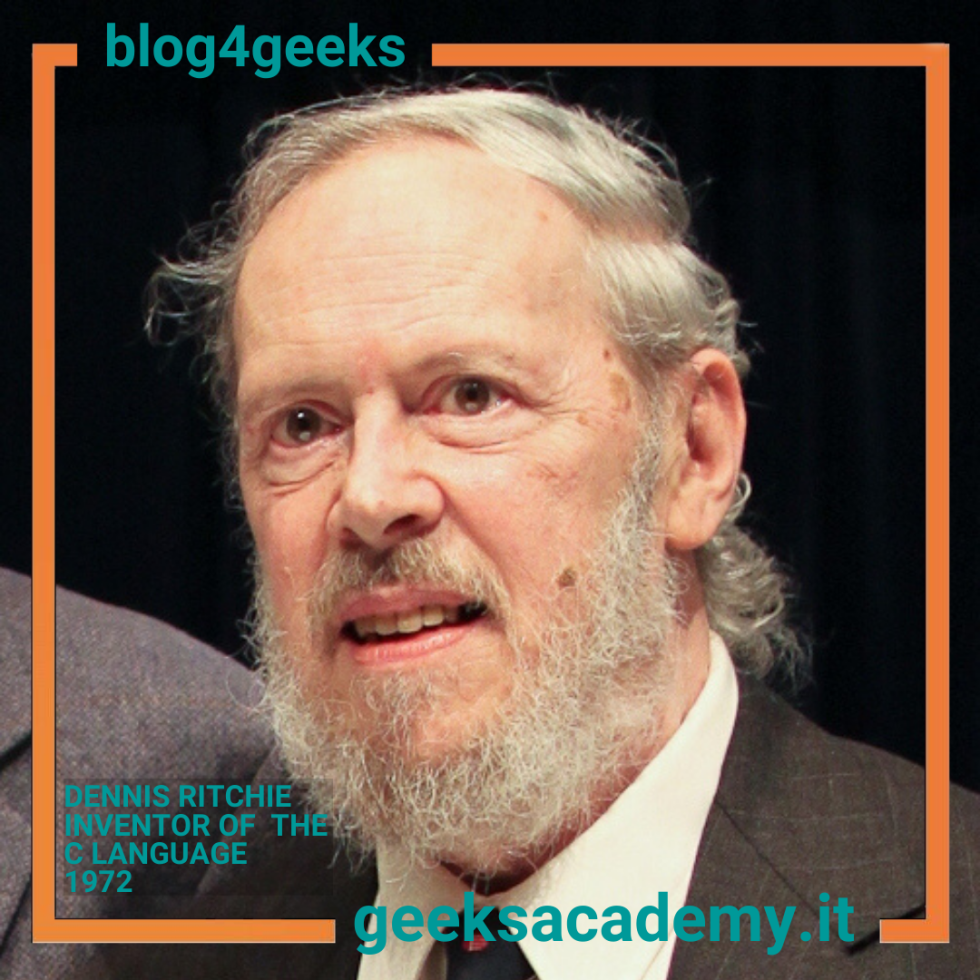
Discover Geeks Academy’s articles on: Blockchain, Coding, Cybersecurity, Cloud, Big Data, Artificial Intelligence, Gaming, Digital Innovation
BIOGRAPHY AND FIRST STEPS
Ritchie was born in New York State in 1943. Son of a Bell Labs scientist and author of a book on circuit switching theory, Ritchie enrolled at the prestigious Harvard University, where he received a degree in applied physics and mathematics in 1963. He also began a PhD in computer science, however, although he had written and, according to some sources even discussed his thesis, Ritchie never officially received the title of PhD from Harvard University, not even post-mortem.
Once he graduated, Ritchie followed in his father's footsteps and started working for Bell Labs, a company for industrial research and scientific development. In 1967, when Ritchie joined Bell Labs, Bell Labs was in charge of operating software for a project called Multics (Multiplexed Information and Computing Service), one of the first time-sharing operating systems written in PL/I Assembly Language with a command line interface and actively developed since 1964. In its original form it was supposed to serve the computing needs of the entire city of Boston, similarly to an electricity or water distribution service. It was co-designed and developed by a consortium comprising of Bell Labs, General Electric and the Massachusetts Institute of Technology.
UNIX
After just four years of development, Bell Labs abandoned the Multics project, which was in deep crisis. One of the most important meetings for the world of computer science took place at Bell Labs: Dennis MacAllistair Ritchie met Kenneth Thompson, a young computer scientist with a passion for micro-computers, with whom he began to collaborate and develop ideas. Thompson and Ritchie were both involved in the development of Multics, of which they saw the potential but recognized the difficulty of design and implementation. The two decided to start working on a smaller and less complicated operating system, which would allow different microcomputer models to interact in a simple and immediate way (IMPORTANT! remember that at that time every hardware had its own operating platform, which was not compatible with other infrastructures and architectures!).
In 1969, within a couple of months, Ritchie and Thompson designed a smaller and less complicated operating system that they called, with a playful reference to Multics, "Unix".
When the first drafts of Unix were presented to the Bell Labs executives, they weren't met with particular enthusiasm, and neither were the prototype made in 1970. However, Thompson and Ritchie managed to convince the Bell Labs patent department of the need to buy a full-size computer and started working on Unix on it. Unix was completed in 1973 and since Bell Labs' parent company, AT&T, could not compete in the computer market, Ritchie and Thompson were given the opportunity to distribute Unix for free to universities and research studios.
The possibility to use Unix on almost all existing computers and to use it in combination with C language determined the great and immediate success of Unix. Unix was even adopted by the Department of Defense of the United States of America for the network research that ended up creating the Internet, and to this day it remains one of the software that holds the virtual world together.
THE PROGRAMMING LANGUAGE C
Since the very first versions of Unix used Machine code and were therefore only adaptable to certain hardware platforms, between 1969 and 1973 Ritchie, in collaboration with Thompson, rewrote the Unix source code using a programming language created ad hoc that had more universal features. The language he created, called C, is the result of years of work and the combination of elements of previous languages, in particular of the B language, which in turn was inspired by the CPL (Combined Programming Language) and the BCPL (Basic CPL), but was too heavy for the hardware available at that time.
The C language allowed them to move the Unix kernel from the original PDP-7, a minicomputer produced by Digital Equipment Corporation, to different platforms, without this affecting the operativity of the software.
The C programming language was fundamental to the development of Unix, which was also equipped with applications for managing files and users that are still in use in modern operating systems.
What made the C language fundamentally different from those written before it, was the versatility and independence of C, as it could be used with all kinds of hardware and software.
AWARDS
Dennis MacAllistair Ritchie received several awards and recognitions for his work with Thompson, among them:
- 1983 Turing Award from the Association of Computing Machinery;
- 1990 IEEE Richard W. Hamming Medal from the Institute of Electrical and Electronics Engineers;
- 1998 US National Medal of Technology, awarded to Ritchie and Thompson by US President Bill Clinton;
- 2005 Achievement Award by the Industrial Research Institute;
- 2011 Japan Prize for Information and Communication.
LAST DAYS
Ritchie died on October 12, 2011 at the age of 70, just one week after the death of Steve Jobs, who died on October 5. Many Unix-like distributions have dedicated a version of the software to MacAllistair Ritchie's memory, such as Fedora 16, which was made available about a month later, and the FreeBSD 9.0 operating system, released on January 12 of the following year.
In 2013 a scholarship was established for the best PhD thesis on software systems research entitled to "Dennis MacAllistair Ritchie, inventor of the C language and co-creator of Unix, the first software to be used on a multitude of different hardware".
Finally, an asteroid, 294727 Dennisritchie, was also dedicated to him.
THE BEST WAY TO HONOR HIS MEMORY
Dennis MacAlistair Ritchie was a pioneer of computing and his work radically changed all future developments: don't let the world be transformed only by others, learn how to program and allow your ideas to take shape in the virtual world. Sign up now for the Geeks Academy courses!
Sources: